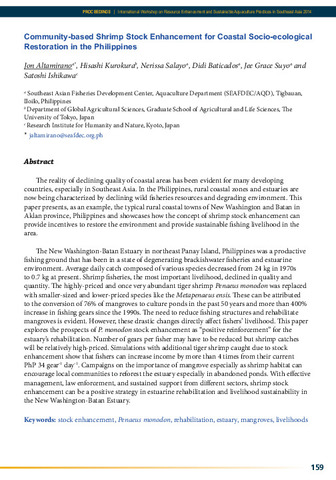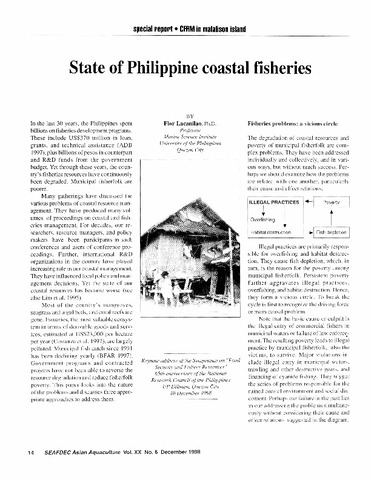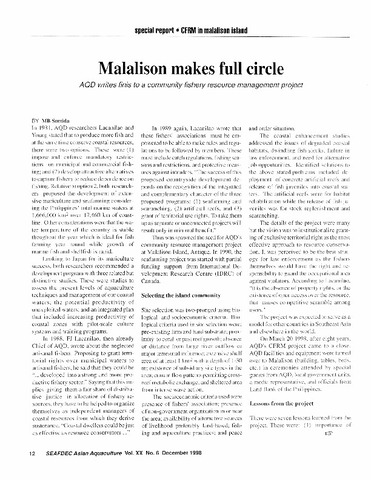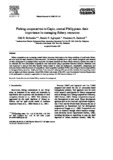Community-based shrimp stock enhancement for coastal socio-ecological restoration in the Philippines
- Global styles
- MLA
- Vancouver
- Elsevier - Harvard
- APA
- Help

วันที่
2015ผู้เขียน
Page views
6,555ASFA keyword
environmental degradation 
resource management
stocking (organisms)
sociology
sustainable fishing
resource conservation
sustainability
coastal zone management
habitat improvement (biological)
livelihoods
catch composition
coastal zone
socioeconomic aspects
fishery management
shrimp fisheries
environmental factors
brackishwater environment
mangroves

resource management

stocking (organisms)

sociology

sustainable fishing

resource conservation

sustainability

coastal zone management

habitat improvement (biological)

livelihoods

catch composition

coastal zone

socioeconomic aspects

fishery management

shrimp fisheries

environmental factors

brackishwater environment

mangroves

AGROVOC keyword
Taxonomic term
เมตาดาต้า
แสดงระเบียนรายการเต็ม
Share
นามธรรม
The reality of declining quality of coastal areas has been evident for many developing countries, especially in Southeast Asia. In the Philippines, rural coastal zones and estuaries are now being characterized by declining wild fisheries resources and degrading environment. This paper presents, as an example, the typical rural coastal towns of New Washington and Batan in Aklan province, Philippines and showcases how the concept of shrimp stock enhancement can provide incentives to restore the environment and provide sustainable fishing livelihood in the area.The New Washington-Batan Estuary in northeast Panay Island, Philippines was a productive fishing ground that has been in a state of degenerating brackishwater fisheries and estuarine environment. Average daily catch composed of various species decreased from 24 kg in 1970s to 0.7 kg at present. Shrimp fisheries, the most important livelihood, declined in quality and quantity. The highly-priced and once very abundant tiger shrimp Penaeus monodon was replaced with smaller-sized and lower-priced species like the Metapenaeus ensis. These can be attributed to the conversion of 76% of mangroves to culture ponds in the past 50 years and more than 400% increase in fishing gears since the 1990s. The need to reduce fishing structures and rehabilitate mangroves is evident. However, these drastic changes directly affect fishers livelihood. This paper explores the prospects of P. monodon stock enhancement as positive reinforcement for the estuary s rehabilitation. Number of gears per fisher may have to be reduced but shrimp catches will be relatively high-priced. Simulations with additional tiger shrimp caught due to stock enhancement show that fishers can increase income by more than 4 times from their current PhP 34 gear-1 day-1. Campaigns on the importance of mangrove especially as shrimp habitat can encourage local communities to reforest the estuary especially in abandoned ponds. With effective management, law enforcement, and sustained support from different sectors, shrimp stock enhancement can be a positive strategy in estuarine rehabilitation and livelihood sustainability in the New Washington-Batan Estuary.
การอ้างอิง
Altamirano, J., Kurokura, H., Salayo, N. D., Baticados, D., Suyo, J. G., & Ishikawa, S. (2015). Community-based shrimp stock enhancement for coastal socio-ecological restoration in the Philippines. In M. R. R. Romana-Eguia, F. D. Parado-Estepa, N. D. Salayo, & M. J. H. Lebata-Ramos (Eds.), Resource Enhancement and Sustainable Aquaculture Practices in Southeast Asia: Challenges in Responsible Production of Aquatic Species: Proceedings of the International Workshop on Resource Enhancement and Sustainable Aquaculture Practices in Southeast Asia 2014 (RESA) (pp. 159-167). Tigbauan, Iloilo, Philippines: Aquaculture Dept., Southeast Asian Fisheries Development Center.
Type
Conference paperISBN
9789719931041
Related items
Showing items related by title, author, creator and subject.
-
State of Philippine coastal fisheries
Lacanilao, Flor (Aquaculture Department, Southeast Asian Fisheries Development Center, 1998) -
Malalison makes full circle: AQD writes finis to a community fishery resource management project
Surtida, Marilyn B. (Aquaculture Department, Southeast Asian Fisheries Development Center, 1998) -
Fishing cooperatives in Capiz, central Philippines: their importance in managing fishery resources.
Baticados, Didi B.; Agbayani, Renato F.; Gentoral, Francisco E. (Elsevier, 1998)Fishery cooperatives can co-manage coastal fishery resources, help improve the living conditions of small-scale fishers, and slow down the rapid depletion of these resources. Ten fisherfolk cooperatives in Capiz, central ...





